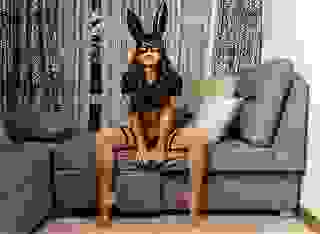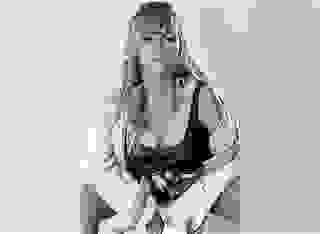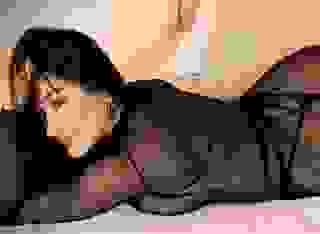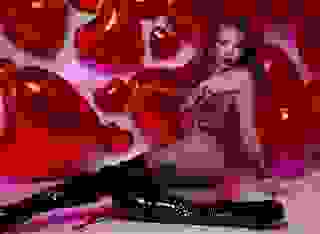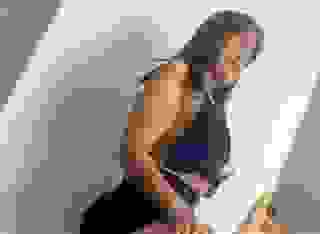- Sci-Fi & Fantasy
- Every Man's Fantasy Ch. 01
Note: You can change font size, font face, and turn on dark mode by clicking the "A" icon tab in the Story Info Box.
You can temporarily switch back to a Classic Literotica® experience during our ongoing public Beta testing. Please consider leaving feedback on issues you experience or suggest improvements.
Click here1 The fugitives
The freezing night-rain came two hours after sunset in the Southern Mountains, when it was already dark and the Herders at the sheep station were in their huts, snuggling in bed to keep warm. The rain lasted half the night. Only the hardy sheep stayed outside.
At midnight, with hailstones thudding on the roof and the wind rattling the shutters, two small figures crept silently out of a hut, careful not to wake the sleeping women. They carried big leather backpacks and wore wide-brimmed leather hats. They ventured fearlessly into the freezing downpour and headed up the mountain.
Rain ran down the gullies. The fugitives - two adolescent girls, one small and skinny, one taller and athletic - trudged through the streams, walking on gravel river-beds in thin leather sandals, despite their freezing feet, leaving no footprints. When the mountain streams were too narrow, they tramped over the sodden grass, avoiding the muddy sheep-tracks that would record their passing.
The volcanic mountains were old and dormant, their peaks weathered into ashy mounds that regularly crumbled down the slopes. The girls picked their way up the mountain, staying on the east side to escape the wind, but there was no escaping the freezing rain that fell in torrents.
There was a sheltered cove about five miles from the sheep station. Here they stopped to rest, unravelling one of their leather backpacks. It opened as the ground sheet of a tent. They sheltered beneath the sheet, cuddling to stay warm.
The younger girl shivered. Her teeth chattered. Her hands and feet were like ice-blocks. But she never complained nor asked to turn back. The older girl held her closely, rubbing the younger girl's hands until she could feel again.
Eventually, the rain stopped and the wind died down but the cold mist penetrated to their bones.
After a few hours' rest, well before dawn, the older girl gently woke her friend and whispered that it was time to go. They squatted together behind a large boulder to relieve themselves, then hefted up their packs and began the climb over the ridge onto the south side of the mountains, trying to put as many miles as they could between them and the Herder Tribe.
It was easier walking along the rims of the volcanoes, heading westward on the southern slopes. When the sun came up at last, it began to dry them out and to burn off the clinging mist. Then the girls could see the size of their ambition. Row upon row of brown and white volcanic peaks stretched in a line before them, leading to a grey and misty horizon under a clear blue sky.
Undaunted, they trekked on.
Their swag bags held flatbreads, round cheeses and long strips of dry salted beef. The older girl took a hunting knife from its holster on her thigh and cut strips of beef for their breakfast. They chewed as they walked. The bladders they carried over their shoulders contained milk. When they drank the bladders dry, they filled them with cold clear water from the small streams that dripped through mossy overhangs beside the ridge.
They walked all day, stopping only when exhaustion forced them to, until the low sun in their eyes meant it was time to seek shelter for the night.
There was a granite cave, a fissure in the mountainside with a roof of compacted gravel and pumice. It was dry and warm inside. Despite their exhaustion, the girls were fascinated by the coloured rocks in the walls, glistening with beams reflected from the orange sun. A purple seam ran across the floor and up one wall.
Too tired to talk, they stared at the dancing reflections until it was time to squeeze into the tent, to hold each other and sleep.
After two days trekking on the ridge of the mountains, the fugitives reached the cliffs, where the rocky walls tumbled drunkenly into the sea. They stayed the night in a hole in one of the cliffs, sheltered from the freezing night-rain. Next morning, they started northward along the beach, hidden from view by the gradually diminishing cliffs.
Before them was a wide golden beach, stretching out for more miles than even their sharp eyes could see.
Behind them were the Southern Mountains, brown-sided and snow-capped. To the left was the ocean, immeasurably vast. To the right was a wide and well-watered prairie, hot and lush, where the Herders and their cattle roamed. Beyond the prairie was a thick forest, grey and green in the hazy distance, with great snowy mountains on the horizon behind.
With wide-brimmed hats to protect them from the scorching sun, water bladders filled from sweet mountain streams and strips of good dried beef between their teeth, the girls set out northward filled with courage and hope.
2 Hyperspace
Hyperspace, so the physics textbook said, was how gravi-space and gravi-time were looped together with quantum interactions. Luckily for those who travelled vast distances through the galaxy by means of hyperspace jumps, it was possible to use a hyperdrive motor without understanding complex physics.
The pilot of a spaceship would plot the starting co-ordinates and what he hoped would be the finishing co-ordinates on a navigation system. The piloting computer would calculate the parameters for the jump and, when he engaged the hyperdrive motor (usually by pressing a big red button on the piloting console), the ship would enter hyperspace, emerging a few seconds later billions of miles away.
Someone who understood the mechanics of hyperspace travel but not the underlying science was a planetary prospector called Ezra Goldrick.
Planetary prospectors were adventurers who courted danger by jumping hundreds of light-years through hyperspace in the hope of discovering interesting and valuable new solar systems. Driven by courage and commercial ambition, they sought asteroids and moons for their mineral content, but the real prize was an Earth-sized planet capable of being terraformed to support human life.
With governments on Earth eager to transport excess populations to pristine new worlds (and the populations themselves keen to emigrate), settler companies were making huge profits and offering substantial bounties to prospectors who discovered Earth-like planets.
Aged forty, Ezra had been a successful prospector for fifteen years, in a profession where success was measured more by survival than by the number of bounties claimed. Now in Earth-year 2,554, he decided to seek his fortune with a risky venture. He had a destination in mind: a previously discovered planet, now lost, that was so much like Earth that his bounty would make him rich for life.
Ezra researched his destination in the libraries of the Anglosphere. He plotted his course on the available star maps. He studied the records of earlier voyagers. He borrowed money from investors, including his parents and friends, and fitted his spaceship out for a long and dangerous journey with a year's supply of rations and a reconditioned hyperspace engine.
He put in a bounty claim to a settler company, Outworld Ventures, but did not bother to tell the Prospectors' Guild where he was going. They would not find a volunteer to rescue him if he got in trouble. Instead, like all prospectors, who live more in fear of claim-jumpers than of jumping through hyperspace into the middle of a star, Ezra kept his destination a secret even from his closest family.
It was in the cause of maintaining this secrecy that Ezra visited his sister at Trinity College, Cambridge, on an overcast winter's day just before he left Earth. The damp appearance of the ancient colleges (their dingy shadows concealing the bright learning going on behind the stone walls) always made a grey day in Cambridge seem even more dull to Ezra, who walked down Trinity Street with his jacket collar raised, to wait outside the grand entrance of the college for Danielle. She taught an advanced astrophysics class on a Wednesday morning and soon skipped up to greet him, bringing human sunshine to mend the deficiencies of the weather.
At six feet tall, Ezra was average height for an Englishman in the mid-twenty-sixth century. He was athletic with mid-brown hair, dark-blue eyes, an ordinary face with a strong clean-shaven chin. His bright and sunny sister was twelve years younger and three inches shorter, an inch above average for the Anglosphere. Where Ezra was average-looking, Danielle was beautiful, with large dark-blue eyes the same shade as his, a high forehead, wide smile, small determined chin and wavy platinum-blonde hair (the product of a salon, to replace the straight mousy-brown hair that she felt did not reflect the gaiety of her disposition).
Danielle took Ezra's arm and pulled him along to a cafe in Market Hill.
The market stalls were covered with striped awnings. Danielle looked out of the window at the browsing students with woollen scarves and shoppers with warm coats while Ezra fetched their coffees.
When he sat down, she had a demand for him.
"Where is it? Where's my letter?"
"What letter?"
"Come on, big Bro. Hand it over."
"I didn't bring it with me."
"Liar!"
"All right."
Ezra took a white sealed envelope from inside his jacket. It had Danielle's name on it and the date. He handed it over.
"Don't open it for a month," he said.
"I know the drill."
She held the letter up to the light, trying to see the writing through the envelope.
They had a ritual. Before a prospecting trip, Ezra wrote his destination on a letter and forbade his sister from opening it until he was well on his way.
Danielle pretended to be disappointed that she could not see the destination. She tried to peak under the flap but it was properly glued down. She pouted in frustration but she was only teasing.
"If you won't say where you're going, at least tell me that you're following known pathways," she said. "Are you using tethered beacons?"
Danielle, the astrophysical engineer, wanted to know that Ezra would be safe. Hyperspace pathways were her speciality. She built them for a living and taught them once a week to a select group of undergraduates.
There were two modes of hyperspace travel. There were 'free' jumps taken by spaceships using their hyperdrive motors to enter hyperspace in one place and emerge seconds later somewhere else in the galaxy. There was also 'tethered' hyperspace travel, which used hyperspace beacons at both ends of a fixed pathway. Here any spaceship could enter one beacon and emerge from the linked beacon in a precisely-known location.
Tethered hyperspace pathways were almost completely safe. Free hyperspace jumps were risky. What made them dangerous, causing travellers to emerge close to stars or even (for a sad but mercifully painless moment) actually inside a star, were what Danielle called 'anomalies'. A hyperspace pathway was extremely sensitive to magnetic flux, x-ray stars, black holes, clouds of charged particles and other quantum interactions which would redirect the traveller toward the nearest gravitating object, sometimes with disastrous consequences.
"My first jump is on a tethered pathway near Capella Space Station," Ezra said. "From then on, I make free jumps, but along pathways that others have travelled before."
This was a slightly disingenuous statement, for reasons Ezra kept to himself, but Danielle took it at face-value and was relieved.
"All right," she said. "I'll let you go, so long as you promise to be safe and to come back."
"I promise."
"I love you, Bro."
"I love you, Sis."
******
With his preliminaries completed and his sister mollified, Ezra returned to London to hand over the keys for his apartment to the agent who would rent it out for a year. With his belongings in storage, he took a last suitcase on an intercontinental ballista flight to Perth, Australia, to say goodbye to his parents, Mariotta and Nathan.
A day later, after a warm and fond farewell, Ezra boarded a stratoliner to the Commonwealth Space Elevator in Equatorial Africa, which lifted him and his small luggage to a shuttlecraft in low-Earth orbit. It transported him to his spaceship, moored at an engineering station 3,000 miles up.
Ezra spent three weeks in space testing his hyperspace engine by making a series of careful jumps on the 43 light-year journey to Capella Space Station.
When he emerged from hyperspace after his last test-jump, Ezra was pleased with his ship. The engine had pushed him through hyperspace without incident a dozen times. He always emerged safely, at or close to his intended location. The navigation system was equally successful, pin-pointing his starting position before a hyperspace jump and quickly confirming his location at emergence.
Internal mechanisms were all working well. The bulkhead airlocks sealed properly. So long as Ezra wore his flight suit, which had magnetic strips along its arms, shoulders and legs (or if he was in normal clothes, when he wore a magnestrip waistband and overshoes), then the magnetic artificial gravitation pulled him firmly toward the floor of the ship. Life-support gave good readings. The ionising air scrubbers wheezed and hummed, as all such units did, even in the most expensive pleasure cruisers. They removed carbon-dioxide efficiently, maintaining a good level of oxygen.
Feeling confident, Ezra proceeded to Capella Space Station under the power of his ship's ion drive.
From 50,000 miles away, the space station was a dot among millions of luminous dots sprinkled heavily on the black curtain of space. It orbited one light-year from the four stars that made up Capella's solar system, two hot and bright yellow stars and two dull red dwarf stars. Dozens of hyperspace beacons shared the space station's orbit.
The beacons were silver-grey rings hundreds of metres in diameter. Their centres were filled by amorphous purple lenses known as 'plumes'. The lenses flickered and glowed with charged particles, as golden lights ran around the inside rims of the beacons.
Both the beacons and the space station were powered by white gamma streams that criss-crossed space around the two brighter yellow stars. Beamed from a legion of solar collectors near the star, the gamma streams were split up by transmitting stations and redirected to receiving dishes on the beacons and the space station.
With 1,000 miles to go, Ezra reversed his ship and used the ion drive to decelerate. Three hours closer and only 100 miles from the space station, he steered by manoeuvring rockets for the last ten minutes of his journey, slowing to match the space station's orbital velocity, following a guided path to a dock.
Capella Space Station looked like a giant gyroscope. It had a spindle six miles long and a great wheel with four thick spokes twelve miles in diameter. It rotated about 600 times a day to create an Earth-normal artificial gravitation for those on the inside surface of the great wheel's rim.
Huge radio dishes grew like mushrooms on the spindle. Radio antennas and masts bristled like hedgehog spines. The bottom of the spindle widened in two places to make a lower Military Dock and an upper Freight Dock. Giant vessels attached themselves nose-first to the space station like sucker-fish. Smaller vessels parked themselves half-way into the docks.
Above the wheel were two more docks: one for passenger ships, the other for smaller private vessels. Cancelling his manoeuvring rockets, Ezra let his ship be guided into a berth on the private vessel dock by magnetic tracking beams. His forward docking system latched to the bulkhead with a firm clunk. A green light showed the mating was airtight and secure. It was safe to open the sealed hatch and enter the passenger dock.
Ezra kept on his flight suit to make use of the magnetic artificial gravity in the zero-gravity dock as he visited stores to order supplies of food, water and fuel, paying with a credit stick that he charged on Earth with ten Galactic Pounds. This was more than the average monthly wage and would leave plenty over for an enjoyable last night on the station.
Back on his ship, Ezra ran final tests on his electronic equipment, the navicoms system and life support. All the self-checks passed. Taking every precaution, he powered the batteries of his emergency escape pods and checked the medical kits that slotted into drawers in the base of the pods.
With his preparations finished, Ezra had a shower. Hot damp air puffed at him in the sealed cubicle. He wiped down with ultra-absorbent sponges.
Dressed in normal clothes, he planned to make his last night in civilisation one to remember.
3 The Goat and Chariot pub
It was evening by Galactic Standard Time. Ezra donned the complimentary magnestrip waistband and overshoes provided in the zero-gravity passenger dock to follow the embarkation route to the customs and hygiene registers. He presented his identity card and health stamp. His samples of breath, saliva and blood were quickly analysed and a healthy verdict given. Two minutes later, Ezra passed through the entry gates to take a lift down to the centre of the spindle. Here he returned the overshoes and waistband. He turned at a right-angle to float into another lift, which went down one of the spokes of the great wheel.
In the plastiglass elevator, he manoeuvred feet-first to join the other passengers in the cubicle. From experience, he tucked his arm around the handrail to hold on tightly. The lift shot off toward the rim of the great wheel, picking up both angular momentum and artificial gravity to unbalance the passengers and create a queasy feeling for anyone unprepared for it.
Most of the station's population lived and worked on the rim, which was divided into four causeways. The West Causeway had posh shops and good hotels. The North Causeway had the homes of the permanent residents, a school, a hospital and a park with a zoo. The South Causeway had food halls and workshops for craftsmen. And the East Causeway had rowdy bars, casinos, pawn-brokers and brothels.
There were 10,000 permanent residents: mechanics, shop-keepers, bankers, teachers, cooks, hydroponics farmers, gardeners and Entertainers (that is, prostitutes, who were legal, licensed and guaranteed to be drug-free and disease-free).
There was also a transient population of space-riggers, miners, freighter crew, military personnel on furlough and Prospectors, who all visited Capella for supplies, to look for work, to feel some gravitation (albeit artificial) underfoot or to gamble, drink, shop, trade and spend time with a friendly Entertainer.
Added to this diverse humanity were thousands of settlers a year from Earth, who came to Capella to embark on giant hyperspace transports to distant planets. Capella Space Station was a gateway to the dozen planets of the Outworld League.
The lift slowly decelerated. It disgorged Ezra onto an unusually quiet East Causeway.
He took the moving walkway twelve blocks clockwise to The Goat and Chariot pub, where the prettiest Entertainers hung out waiting for customers. He was seeking his favourite: a woman called Hestia. When he got to the pub, Ezra saw that his quarry was absent. The bar was deserted, except for the slow barman and a petite young Asian woman in a short pink skirt and a yellow crop-top. She was thin, with a round face, dark-brown eyes and long straight black hair down below her shoulders. A fringe suited her pretty face, which had attractive small dimples.
The girl occupied a stool at the bar, nursing a drink of an ugly green colour with a foolish-looking umbrella in it. Assuming she was an Entertainer, Ezra took a place at the bar next to her and ordered himself a beer.
"Well, this is my last night on Capella," he said. "Any idea what people do for fun around here?"
The girl smiled up at him. If she recognised his words as a standard pickup line in that establishment, she did not show it but answered politely.
